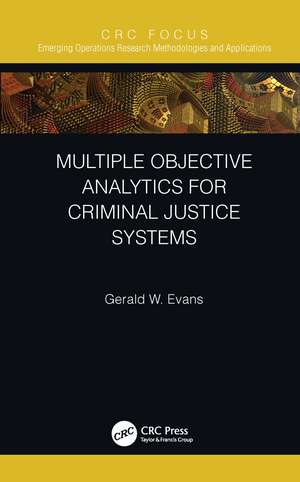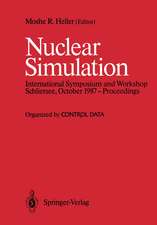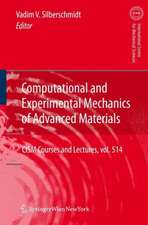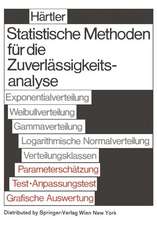Multiple Objective Analytics for Criminal Justice Systems: Emerging Operations Research Methodologies and Applications
Autor Gerald W. Evansen Limba Engleză Hardback – 23 dec 2020
This book is meant to be used by those who would like 1) an introduction to criminal justice systems and 2) an illustration of how some of the various methodologies of analytics can be used to address specific issues in criminal justice systems.
This book will be of interest to faculty, students, and researchers in schools/departments of criminal justice, law, public affairs, political science, industrial engineering, and management. In addition, the book should be of use to government analysts who study the effects of criminal programs and laws.
| Toate formatele și edițiile | Preț | Express |
|---|---|---|
| Paperback (1) | 126.91 lei 6-8 săpt. | |
| CRC Press – 9 oct 2024 | 126.91 lei 6-8 săpt. | |
| Hardback (1) | 393.17 lei 3-5 săpt. | +18.32 lei 7-13 zile |
| CRC Press – 23 dec 2020 | 393.17 lei 3-5 săpt. | +18.32 lei 7-13 zile |
Preț: 393.17 lei
Nou
Puncte Express: 590
Preț estimativ în valută:
75.23€ • 78.55$ • 62.26£
75.23€ • 78.55$ • 62.26£
Carte disponibilă
Livrare economică 15-29 martie
Livrare express 01-07 martie pentru 28.31 lei
Preluare comenzi: 021 569.72.76
Specificații
ISBN-13: 9780367517342
ISBN-10: 0367517345
Pagini: 156
Ilustrații: 1 Line drawings, black and white; 4 Halftones, black and white; 6 Tables, black and white; 5 Illustrations, black and white
Dimensiuni: 138 x 216 x 17 mm
Greutate: 0.34 kg
Ediția:1
Editura: CRC Press
Colecția CRC Press
Seria Emerging Operations Research Methodologies and Applications
ISBN-10: 0367517345
Pagini: 156
Ilustrații: 1 Line drawings, black and white; 4 Halftones, black and white; 6 Tables, black and white; 5 Illustrations, black and white
Dimensiuni: 138 x 216 x 17 mm
Greutate: 0.34 kg
Ediția:1
Editura: CRC Press
Colecția CRC Press
Seria Emerging Operations Research Methodologies and Applications
Public țintă
Adult educationCuprins
1. Criminal Justice Systems in the United States: Basic Concepts. 2. Analytics and Criminal Justice Systems. 3. Using Analytics to Address Programs and Policies Associated with Criminal Justice Systems. 4. Using Analytics to Analyze and Improve State and Federal Laws.
Notă biografică
Gerald W. Evans is Professor Emeritus in the Department of Industrial Engineering at the University of Louisville (UL). His research and teaching interests lie in the areas of multiciteria decision analysis, simulation modeling and analysis, optimization, logistics and project management.
Previous positions include Industrial Engineer for the Department of the Army, and Senior Research Engineer for General Motors Research Laboratories. He has also served as an ASEE Faculty Fellow at NASA's Langley Research Center and Kennedy Space Center.
Dr. Evans received his BS in Mathematics in 1972, his MS in Industrial Engineering in 1974, and his PhD in Industrial Engineering in 1979, all from Purdue University.
Dr. Evans has served as Principal Investigator or Co-Principal Investigator on over $5 million of funded research from organizations such as the National Science Foundation, the Defense Logistics Agency, NASA, the National Institute for Hometown Security, Louisville Metro Government, General Electric, and United Parcel Services among other organizations. In addition, he has done consulting work in the areas of simulation modeling and analysis, project management, and economic analysis for a variety of organizations.
He has published approximately 100 papers in various journals and conference proceedings. His paper: "An Overview of Techniques for Solving Multiobjective Mathematical Programs," published in 1984 was listed as one of the most cited publications in Management Science over the last 50 years (from the 2004 commemorative CD: Celebrating 50 years of Management Science, INFORMS Publication). In addition, his co-authored paper: S.J. Ellspermann, G.W. Evans, and M. Basadur, "The Impact of Training on the Formulation of Ill Structured Problems," Omega 35:2, pp. 221-236, April 2007 received the 12th Annual Citation of Excellence Award as one of the top 50 management articles out of 15,000 articles published in 2007 (Emerald Management Reviews), 2008.
Dr. Evans is the author of Multiple Criteria Decision Analysis for Industrial Engineering: Methodology and Applications, CRC Press, Taylor and Francis Group, Boca Raton, FL, 2017, and co-editor of the book: Analytics, Operations, and Strategic Decision Making in the Public Sector, Hershey, PA.: IGI Global, 2019. He has also served as co-editor of the Proceedings of the Winter Simulation Conference in 1993 and 1999, and of a special issue of Computers and Industrial Engineering entitled "Multi-Criteria Decision Making in Industrial Engineering" (November, 1999). He has been a reviewer for approximately 25 different journals, an Associate Editor for the Institute of Industrial Engineers (IIE) Transactions, a Director of the Operations Research Division of IIE, and a Vice President of IIE.
In addition, he has directed or co-directed the research of approximately 90 masters’ students and 20 doctoral students while at the University of Louisville.
Dr. Evans has received the Fellow Award and the Operations Research Division Award from Institute of Industrial and Systems Engineering, the Moving Spirit Award from INFORMS for his work with the UL INFORMS Student Chapter, the Dean's Award for Outstanding Graduate Teaching; and he was a University of Louisville nominee for Outstanding Faculty of Adult Learners for Kentukiana Metroversity Inc. He is listed in American Men and Women of Science, Who's Who in Engineering, and Who's Who in America.
Previous positions include Industrial Engineer for the Department of the Army, and Senior Research Engineer for General Motors Research Laboratories. He has also served as an ASEE Faculty Fellow at NASA's Langley Research Center and Kennedy Space Center.
Dr. Evans received his BS in Mathematics in 1972, his MS in Industrial Engineering in 1974, and his PhD in Industrial Engineering in 1979, all from Purdue University.
Dr. Evans has served as Principal Investigator or Co-Principal Investigator on over $5 million of funded research from organizations such as the National Science Foundation, the Defense Logistics Agency, NASA, the National Institute for Hometown Security, Louisville Metro Government, General Electric, and United Parcel Services among other organizations. In addition, he has done consulting work in the areas of simulation modeling and analysis, project management, and economic analysis for a variety of organizations.
He has published approximately 100 papers in various journals and conference proceedings. His paper: "An Overview of Techniques for Solving Multiobjective Mathematical Programs," published in 1984 was listed as one of the most cited publications in Management Science over the last 50 years (from the 2004 commemorative CD: Celebrating 50 years of Management Science, INFORMS Publication). In addition, his co-authored paper: S.J. Ellspermann, G.W. Evans, and M. Basadur, "The Impact of Training on the Formulation of Ill Structured Problems," Omega 35:2, pp. 221-236, April 2007 received the 12th Annual Citation of Excellence Award as one of the top 50 management articles out of 15,000 articles published in 2007 (Emerald Management Reviews), 2008.
Dr. Evans is the author of Multiple Criteria Decision Analysis for Industrial Engineering: Methodology and Applications, CRC Press, Taylor and Francis Group, Boca Raton, FL, 2017, and co-editor of the book: Analytics, Operations, and Strategic Decision Making in the Public Sector, Hershey, PA.: IGI Global, 2019. He has also served as co-editor of the Proceedings of the Winter Simulation Conference in 1993 and 1999, and of a special issue of Computers and Industrial Engineering entitled "Multi-Criteria Decision Making in Industrial Engineering" (November, 1999). He has been a reviewer for approximately 25 different journals, an Associate Editor for the Institute of Industrial Engineers (IIE) Transactions, a Director of the Operations Research Division of IIE, and a Vice President of IIE.
In addition, he has directed or co-directed the research of approximately 90 masters’ students and 20 doctoral students while at the University of Louisville.
Dr. Evans has received the Fellow Award and the Operations Research Division Award from Institute of Industrial and Systems Engineering, the Moving Spirit Award from INFORMS for his work with the UL INFORMS Student Chapter, the Dean's Award for Outstanding Graduate Teaching; and he was a University of Louisville nominee for Outstanding Faculty of Adult Learners for Kentukiana Metroversity Inc. He is listed in American Men and Women of Science, Who's Who in Engineering, and Who's Who in America.
Recenzii
"The book comprehensively covers the application of multi criteria decision making approaches to the different areas of criminal justice system. The book seems to be very well written with real world examples, a great reference book for scholars in the fields of criminal justice, industrial engineering, operations research, and mathematics. I will certainly recommend the book to our university library."
- Aman Gupta, Associate Professor, Embry-Riddle Aeronautical University
"This book provides clear and comprehensive coverage on the use of decision analytics to evaluate and improve decision making within the complex criminal justice system.
Dr. Jerry Evans’ writing style, in-depth research, and organized presentation make this book a "must read" for anyone looking to learn more about how our justice system operates and about how better decisions can be made through the application of multi-objective decision techniques. The book offers countless examples and straightforward explanations, and as such, should be of interest to wide range of readers."
- John S. Usher, Professor, University of Louisville
"Criminal Justice has become a topic of great interest, especially in the past few years. This book shows how industrial engineering tools can be applied to an important societal problem and help policy makers make sound decisions."
- Sunderesh Heragu, Oklahoma State University
"Focusing on the issues of bail reform, prison privatization, "get tough" policies and reintegration of ex-offenders, the author shows how the objective analysis of data can yield more effective policies than a mountain of politically tinged rhetoric or emotional anecdotes. Prof. Evans swells the chorus of researchers seeking to replace our tendency to periodically see-saw from overly harsh to overly lenient policies with practices based on data-driven pragmatism. His book contributes to a noble endeavor with the potential to save not only misspent dollars but misspent lives."
- Steven M. Fleece, Trial Court Judge, State of Indiana (retired)
- Aman Gupta, Associate Professor, Embry-Riddle Aeronautical University
"This book provides clear and comprehensive coverage on the use of decision analytics to evaluate and improve decision making within the complex criminal justice system.
Dr. Jerry Evans’ writing style, in-depth research, and organized presentation make this book a "must read" for anyone looking to learn more about how our justice system operates and about how better decisions can be made through the application of multi-objective decision techniques. The book offers countless examples and straightforward explanations, and as such, should be of interest to wide range of readers."
- John S. Usher, Professor, University of Louisville
"Criminal Justice has become a topic of great interest, especially in the past few years. This book shows how industrial engineering tools can be applied to an important societal problem and help policy makers make sound decisions."
- Sunderesh Heragu, Oklahoma State University
"Focusing on the issues of bail reform, prison privatization, "get tough" policies and reintegration of ex-offenders, the author shows how the objective analysis of data can yield more effective policies than a mountain of politically tinged rhetoric or emotional anecdotes. Prof. Evans swells the chorus of researchers seeking to replace our tendency to periodically see-saw from overly harsh to overly lenient policies with practices based on data-driven pragmatism. His book contributes to a noble endeavor with the potential to save not only misspent dollars but misspent lives."
- Steven M. Fleece, Trial Court Judge, State of Indiana (retired)
Descriere
Criminal justice systems are complex and difficult to design and operate. This is due to their many interacting parts, and dynamic and probabilistic nature, as well as their interfaces with other systems. This book reviews the use of analytics to address issues in criminal justice systems and the various data sources.


































